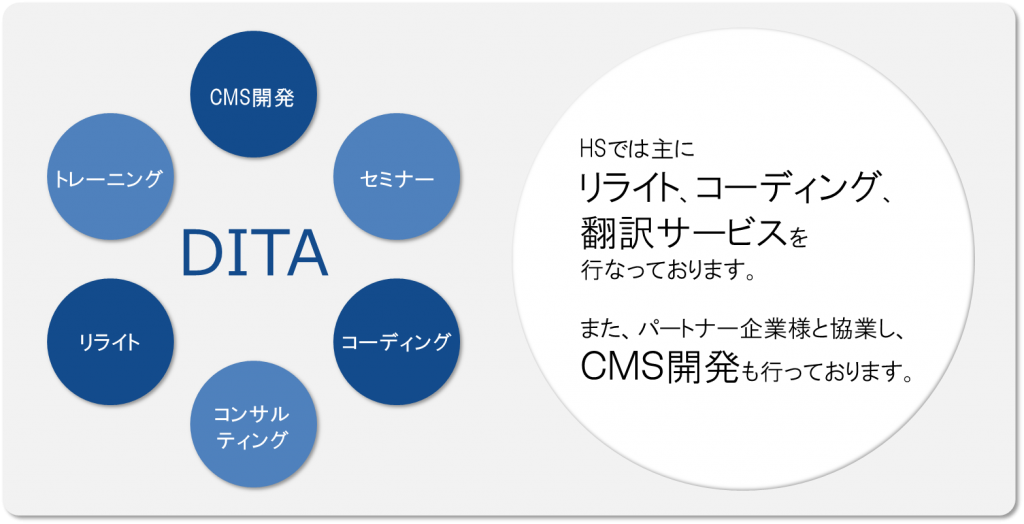English and Multilingual Deployment of DITA
DITA, which is already widely adopted in Europe and the United States. Various manufacturers are utilizing DITA to efficiently create and manage vast and frequently updated manuals and documents.
The number of domestic manufacturers adopting or considering DITA is gradually increasing, and it is expected to become mainstream in the future.
Human Science participates in the DITA Consortium Japan as a DITA player, providing dissemination activities for DITA and specialized services that support DITA.
What is DITA?
Abbreviation for Darwin Information Typing Architecture. It is an XML-compliant architecture developed by OASIS (Organization for the Advancement of Structured Information Standards) for the creation, management, and utilization of information.
It is characterized by dividing documents into units of 4 to 5 sentences and maintaining them comprehensively as components, allowing for the reuse of information in different contexts and supporting output in various formats (PDF, HTML).
Solution Process
Based on the document and manual production know-how cultivated since our establishment in 1985,
we propose an efficient management, operation, and maintenance flow for large volumes of documents utilizing systems.
- Pre-implementation Consulting
-
Hearing (Confirmation of Customer's Concerns and Requests)
- ・Document Management・Investigation of Operational Status
- - Analysis and evaluation of manual and document structure
- Design
-
Design and Requirements Definition
- Manuals, document design, document structure, design layout, organization of information, etc.
- ・System (CMS) Design
- Development
-
Development
- ・System (CMS) Development
- Implementation Support
-
- Pre-implementation Training
- Operations
- Support
We will propose production tailored to your needs from implementation to operation.
- ・Reorganization of manuals and documents
- ・Manual Rewrite
- >>Benefits of Rewriting Text Before Introducing DITA
- - Componentization, Topic Writing (in the case of DITA)
- ・Translation
- - Coding, XML editing
DITA Services Provided by Human Science

Document management for English and multilingual deployment proposed by Human Science
In the case of traditional manual creation using FrameMaker, InDesign, or Word, the entire book was the target for translation and editing.
On the other hand, with DITA, documents are managed as components divided into units of 4 to 5 sentences. Therefore, during revisions, only the newly added or updated sections are subject to translation, which reduces translation costs and labor.
- Cost Reduction for Translation Costs (Repetition Parts)
-
In standard documents, even when using translation support software, a cost of about 10% of the translation fee is incurred for Repetition (*). However, in DITA, which is managed independently on a unit basis, there are no Repetition costs at the paragraph level.
* When the same section appears repeatedly, it can be reused at the sentence level.
- Reduction of Work Cycle
- By translating in unit increments, we can continuously provide our clients with translated texts in smaller units. There is no need to check a large volume of documents all at once. This resolves the issue of "not having enough time to check thoroughly."
- Stable Workflow
- The XML standard used in DITA is not affected by the computer environment. In applications like Word, there are issues where the appearance of files varies depending on the environment, often leading to adjustments between translation companies and clients. On the other hand, DITA is environment-independent, and when processed through translation support software, it does not affect layouts, significantly reducing the man-hours required in the pre- and post-translation processes.
- Cost reduction through DTP automation
- With DITA, you can automatically generate documents for multiple media (PDF/HTML/CHM/ePub, etc.) from a single source. This eliminates the need for editing and authoring tasks that were previously required for each medium.
Especially in multilingual projects, it significantly reduces the editing and authoring costs and efforts that were required for each language.
About DITA Consortium Japan
Human Science participates in the DITA Consortium Japan as a DITA player, engaging in the promotion of DITA and providing services that support DITA.
The DITA Consortium Japan is an organization established with the purpose of promoting DITA in Japan, accumulating DITA know-how, and leading the re-engineering of content production in companies through international discourse and communication regarding DITA, thereby contributing to the Japanese industrial sector.
For more information about the DITA Consortium Japan, please visit the site below.
http://dita-jp.org/
For those who want to know more about translation into English and other languages
- Reception hours: 9:30 AM to 6:15 PM JST
Tokyo: +81-3-5321-3111 Nagoya: +81-52-269-8016


